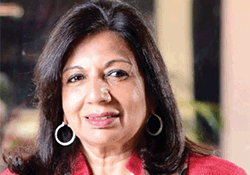April 2017
 You've had an impressive impact internationally — advancing women in science on a global stage. Can you speak to what you've observed over your career in terms of how opportunities for women in science have evolved?
You've had an impressive impact internationally — advancing women in science on a global stage. Can you speak to what you've observed over your career in terms of how opportunities for women in science have evolved?
Women have been playing a crucial role in science for over a century. Unfortunately, deep-rooted gender biases led to women’s scientific contributions either being ignored or being credited to male colleagues.
Thankfully, the landscape is changing now as more and more women prove their mettle as engineers, mathematicians, and computer programmers. Scientific organizations are realizing the diversity of thought, creativity and innovation that women bring to the table and this is opening up more opportunities for women scientists.
This is true even in India today, where women are creating headlines in STEM fields. Likewise, a recent report showed that out of 3,000 biotech start-ups set up in India in the last five years, more than one-third were led by women entrepreneurs.
How have women influenced health care outcomes over the past quarter century?
The influence that women exert on healthcare outcomes is best encapsulated by the Lancet Commission on Women and Health report, which found that women contribute approximately US $3 trillion to health care globally, or nearly 5% of global GDP. While women play a vital role in the global health care workforce as nurses, midwives, community health workers and doctors, they also make informal contributions to health care by giving care in the home. The report also found that 80% of health care decisions for the family are made by women. If valued, this unpaid contribution could account for up to 2.35% of global GDP!
In India, the government has been able to improve the effectiveness of its health care interventions by expanding the involvement of women. The country has deployed nearly 1 million trained female community health advocates under its ASHA or Accredited Social Health Activist program.
Despite recent advances in health care, we reside in a world today that continues to struggle with health care disparities. You've faced this issue head on in your career. Is there a clear path to bridging that gap? Do you see a viable solution as a governmental issue, an extension of corporation responsibility or a non-profit /Foundation issue?
I believe advances in Information and Communication Technologies (ICTs) provide a very effective tool for improving health care delivery and thus reducing health care disparities across the globe.
Indian cardiac surgeon Dr. Devi Shetty has demonstrated how technology and economies of scale can be welded together to make access to quality health care non-discriminatory. His Narayana Health chain of multi-specialty hospitals in India offer heart surgery at a fraction of the cost in developed countries, and is a medical Mecca for patients from Africa, South & South East Asia and Middle East. The Mazumdar-Shaw Cancer Center, my philanthropic initiative in partnership with Dr. Shetty, aims to create a sustainable affordable cancer care model that leverages advanced technologies, state-of-the-art diagnostic tools and best-in-class talent to address the challenges associated with this debilitating disease. Our unique cancer care model enables the poor to access treatment at costs subsidized by those who can afford it. The Mazumdar-Shaw Centre for Translational Research, which is an integral part of the hospital, has developed a number of advanced yet affordable genomics based cancer diagnostics including liquid biopsies. This is enabling early diagnosis and better treatment outcomes based on personalized medicine.
Biocon, the company that I founded in 1978, has committed its Corporate Social Responsibility in the area of primary healthcare leveraging software engineering and cloud computing to create a network of e-enabled primary health centres (centers) that collect and create medical records on cloud data bases that can be remotely accessed real-time through telemedicine thereby addressing the huge doctor deficit.
In the final analysis, I believe that all stakeholders - the government, corporates and non-profits – need to come together to provide reliable and affordable access to high-quality health care for every citizen.
What are your impressions of the work of our awardees?
The list of those who have received the Advancing Women in Science and Medicine (AWSM) Awards is inspiring! From CRISPR to neuroscience, each and every recipient of this award has made deep and path-breaking contributions in the field of science and medicine. They are true role models for scores of young women who are aspiring to make a mark in STEM.
Science, and research in particular have long been primarily male domains. What advice would you give a young woman who's interested in a career in science today?
I think that there are many more opportunities for a young woman who’s interested in a career in science today than there were when I graduated. While the avenues are many, I believe the one thing that has not changed from the time that I started is the recipe for success. I believe that if you want to succeed in this field you have to be innovation led. You should pursue a pioneering spirit that more often than not separates leaders from the followers. Courage of your conviction and perseverance to overcome disappointments and failures are the hallmarks in this journey of endurance.
My underlying belief is “Persevere till you succeed. Failure is temporary but giving up is permanent!” Believe in your goals and aspirations and attain them with a sense of purpose.
Our thanks to Ms. Kiran Mazumdar-Shaw for her thoughtful responses. We are looking forward to seeing you at the luncheon on May 4th.
Related Links:
Advancing Women in Science and Medicine Awards Luncheon
Make a donation to Advancing Women in Science and Medicine